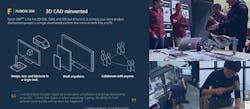Ministry of Science and Technology, NSTDA, and Autodesk partner to advance digital manufacturing in Thailand
BANGKOK, 23 June 2016. The National Science and Technology Development Agency (NSTDA), the Ministry of Science and Technology, and Autodesk officials signed a Memorandum of Understanding (MOU) to help advance Thailand’s manufacturing competitiveness through industry-wide adoption of leading-edge 3D technologies and digital manufacturing capabilities.
NSTDA, under the Ministry of Science and Technology, and Autodesk will aim to jointly establish a Digital Manufacturing Platform in support of the National Digital Economy Master Plan. This will provide up to 100,000 engineers and vocational professionals from companies of all sizes with subscription-based access to Autodesk’s 3D design, manufacturing, simulation, and collaboration tools, services, and training for three years.
“Manufacturing is critical to our economy. Digital manufacturing technologies and talent development will propel Thailand forward in a highly competitive market. The Digital Manufacturing Platform powered by Autodesk technologies will help local players increase the pace of innovation, and promote connectivity and collaboration in alignment to the government’s Digital Economy goals,” says Dr. Thaweesak Koanantakool, President, The National Science and Technology Development Agency (NSTDA).
Two key technologies within the Digital Manufacturing Platform are Autodesk’s Fusion 360 and A360 Team. Fusion 360 brings together computer-aided design, manufacturing and engineering (CAD, CAM and CAE). Available for Mac, PC, or mobile, Fusion 360 is an integrated, connected, and accessible tool built for the new ways products are being designed and made. It also provides the context to understand all aspects of a project and collaborate with everyone participating through the use of A360. A360 modernizes the way people work together and captures all project information and activity, giving teams a central place to collaborate.
“Technologies like the Internet of Things, augmented and virtual reality, robotics, and additive manufacturing (also known as 3D printing) are disrupting the industry. The Digital Manufacturing Platform gives local talent and companies the tools to transform every link in the manufacturing value chain, and the opportunity for Thailand to lead in the Future of Making Things,” explains Mr. Rama Tiwari, Regional director of sales, Autodesk ASEAN.
“Thailand will need to adapt in this 21st century world from a Thailand 3.0 model to a ‘Thailand 4.0 model’, in order to advance Thailand further. This is to support Thailand in changing from a country with ‘middle income’ to ‘high income’, moving the economy from one that operates on ‘performance’ to one that progresses through ‘innovation’,” explains Dr. Pichet Durongkaveroj, Minister of Science and Technology.
“One of the initiatives and mechanisms for moving into an economy of Thailand 4.0 is through the use of technology in Industry 4.0, which will adopt the greater use of digital technologies in manufacturing. A special element of this is the ability to directly connect the needs of consumers to the manufacturing process, which implies that larger factories would not necessarily be a competitive edge or limitation for operators any longer. This phenomenon will indeed have an immense impact on the economy’s infrastructure,” Dr. Durongkaveroj adds.
“Through the cooperation of world-leading companies like Autodesk with the NSTDA, this will support local SMEs in using digital technologies in their design and manufacturing processes, as well as elevating the capabilities of Thai talent to be ready for the manufacturing industry of the future. Moreover, this leads to the creation of value in industries, which coincides with the policy objectives of the government, such as in the biotechnology industry, renewable energy, engineering and design industries related to enhancing the quality of life, and the creative economy industry, which will strengthen the country further,” Dr. Durongkaveroj says.
The Digital Manufacturing Platform is one of several initiatives in the on-going collaboration between NSTDA and Autodesk to support Thailand’s Digital Economy. Other areas of focus include joint research programs and building the technology platform to support the nation’s Smart Cities initiatives.
The National Science and Technology Development (NSTDA) was established by the Science and Technology Development Act in 1991 for National Centers for Technology (the National Center for Genetic engineering and Biotechnology; the National Metal and Materials Technology Center; the National Electronics and Computer Technology Center; the National Nanotechnology Center); and The Technology Management Center.
NSTDA’s principal mandate is to conduct and support research, development, and engineering, to provide technology transfer, and to develop manpower and S&T infrastructure for the country.
Autodesk helps people imagine, design and create a better world. Design professionals, engineers, architects, and digital artists, students, and hobbyists use Autodesk software to unlock their creativity and solve important challenges.
You might also like:
Subscribe today to receive all the latest aerospace technology and engineering news, delivered directly to your e-mail inbox twice a week (Tuesdays and Thursdays). Sign upfor your free subscription to the Intelligent Inbox e-newsletter at http://www.intelligent-aerospace.com/subscribe.html.
Connect with Intelligent Aerospace on social media: Twitter (@IntelligentAero), LinkedIn,Google+, and Instagram.
Intelligent Aerospace
Global Aerospace Technology NetworkIntelligent Aerospace, the global aerospace technology network, reports on the latest tools, technologies, and trends of vital importance to aerospace professionals involved in air traffic control, airport operations, satellites and space, and commercial and military avionics on fixed-wing, rotor-wing, and unmanned aircraft throughout the world.



